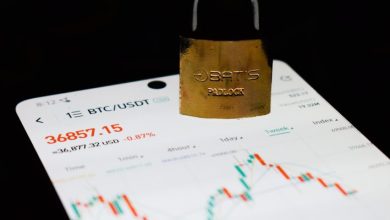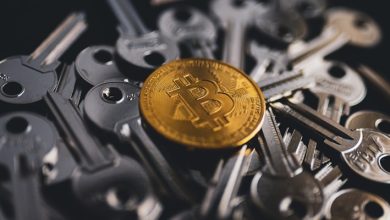Myth: Bitcoin Is Controlled by a Single Entity

- Dispelling the Myth of Bitcoin’s Centralized Control
- Understanding the Decentralized Nature of Bitcoin
- Debunking the Misconception of a Single Entity Controlling Bitcoin
- Exploring the Distributed Network of Bitcoin Miners
- The Truth Behind Bitcoin’s Lack of Central Authority
- Demystifying the Myth of Bitcoin’s Alleged Centralization
Dispelling the Myth of Bitcoin’s Centralized Control
Contrary to popular belief, Bitcoin is not controlled by a single entity. In fact, one of the key principles of Bitcoin is its decentralized nature. This means that no one person or organization has control over the network. Instead, Bitcoin operates on a peer-to-peer network, where all participants have an equal say in how the system functions.
Every transaction on the Bitcoin network is verified by a network of computers, known as miners. These miners compete to solve complex mathematical puzzles in order to validate transactions and add them to the public ledger, known as the blockchain. This process ensures that no single entity can manipulate the system for their own gain.
Furthermore, the Bitcoin network is open-source, which means that anyone can view the code and propose changes to the protocol. This transparency helps to prevent any one entity from exerting control over the network. Additionally, the decentralized nature of Bitcoin makes it resistant to censorship and government interference.
Understanding the Decentralized Nature of Bitcoin
One of the key aspects to understand about Bitcoin is its decentralized nature. Unlike traditional currencies that are controlled by governments or financial institutions, Bitcoin operates on a peer-to-peer network. This means that there is no single entity that has control over the entire Bitcoin network.
Instead, Bitcoin relies on a network of users (also known as miners) who validate transactions and secure the network. These users use powerful computers to solve complex mathematical problems, which in turn helps to confirm transactions and maintain the security of the network. Because of this decentralized network, no single entity can control Bitcoin.
Decentralization is one of the core principles of Bitcoin and is what sets it apart from traditional currencies. This decentralized nature means that no government or financial institution can manipulate the supply of Bitcoin or control how it is used. Instead, Bitcoin operates based on a set of rules that are built into its code, making it a truly peer-to-peer and decentralized currency.
Debunking the Misconception of a Single Entity Controlling Bitcoin
One of the most common misconceptions about Bitcoin is that it is controlled by a single entity. This myth often stems from a lack of understanding of how the decentralized nature of Bitcoin works. In reality, Bitcoin operates on a peer-to-peer network, with thousands of nodes around the world working together to validate transactions and secure the network.
Each node in the Bitcoin network has a copy of the blockchain, which is a public ledger that records all transactions. This means that no single entity has control over Bitcoin, as the network is distributed and no one node has the power to make changes to the blockchain without consensus from the rest of the network.
Furthermore, the open-source nature of Bitcoin means that anyone can participate in the network by running a node or mining for new coins. This decentralized approach is what makes Bitcoin resistant to censorship and manipulation by any single entity.
Exploring the Distributed Network of Bitcoin Miners
One of the key features of the Bitcoin network is its decentralized nature, which is maintained by a distributed network of miners. These miners are individuals or organizations that use specialized computer hardware to solve complex mathematical puzzles in order to validate transactions on the blockchain. The process of mining not only secures the network but also creates new bitcoins as a reward for the miners’ efforts.
It is important to note that the Bitcoin network is made up of thousands of miners located all around the world. Each miner competes with others to validate transactions and add them to the blockchain. This competition ensures that no single entity has control over the network. In fact, the decentralized nature of Bitcoin is one of its key strengths, as it makes the network more secure and resistant to censorship or manipulation.
Furthermore, the distribution of miners across different countries and regions helps to prevent any one government or organization from exerting undue influence over the network. This global network of miners ensures that decisions about the future of Bitcoin are made through a consensus process, with no single entity able to dictate the rules of the network.
The Truth Behind Bitcoin’s Lack of Central Authority
One of the common misconceptions about Bitcoin is that it is controlled by a single entity. In reality, Bitcoin operates on a decentralized network, meaning there is no central authority governing the cryptocurrency. This lack of central authority is actually one of the key features that sets Bitcoin apart from traditional currencies.
Unlike fiat currencies that are controlled by governments or central banks, Bitcoin is maintained by a network of nodes that validate transactions and secure the network. These nodes work together to ensure the integrity of the system, making it virtually impossible for any single entity to take control of Bitcoin.
While there are influential figures within the Bitcoin community, such as developers and miners, they do not have the power to dictate how the network operates. Decisions about the future of Bitcoin are made through a consensus mechanism, where stakeholders come to an agreement on proposed changes.
Overall, the decentralized nature of Bitcoin is what makes it a truly revolutionary form of currency. It allows for greater transparency, security, and resilience against censorship or manipulation. So next time you hear someone claim that Bitcoin is controlled by a single entity, you can confidently debunk that myth with the truth about its lack of central authority.
Demystifying the Myth of Bitcoin’s Alleged Centralization
Contrary to popular belief, Bitcoin is not controlled by a single entity. The decentralized nature of the cryptocurrency is one of its key features and strengths. While some critics argue that a few large mining pools have too much influence over the network, the reality is that no single entity has control over Bitcoin.
Bitcoin operates on a peer-to-peer network, with thousands of nodes around the world working together to validate transactions and secure the network. This distributed network ensures that no single entity can manipulate the system for their own gain.
Furthermore, the open-source nature of Bitcoin means that anyone can participate in the network. Individuals, businesses, and organizations from all over the world are free to run nodes, mine Bitcoin, and contribute to the development of the technology.
While it is true that some mining pools have a large share of the network’s hashing power, this does not equate to centralization. Miners are incentivized to act in the best interest of the network, as any malicious behavior would undermine the value of their own holdings.
In conclusion, the myth of Bitcoin’s alleged centralization is just that – a myth. The decentralized nature of the cryptocurrency ensures that no single entity has control over the network, making it a truly global and democratic system.



